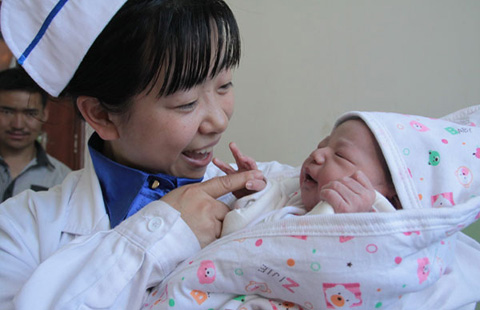Farmers central to governments' roles in urbanization
By Li Yang (chinadaily.com.cn) Updated: 2014-07-24 17:06Governments at various levels should fulfill their responsibilities in pilot urbanization projects by focusing on serving the people, rather than only pursuing economic growth, said an article in 21st Century Business Herald. Excerpts:
The central authority recently asked provincial governments to choose some cities and towns with populations of more than 100,000 to pilot a new type of urbanization, featuring the urbanization of the agricultural population and equalization of public welfare and services.
Focusing on small and mid-sized cities in urbanization can effectively bridge the gap between the countryside and large cities in China, in terms of governance and public services, and relieve population pressure on mega-cities.
However, government officials should bear in mind that urbanization is a natural result of economic and social development. The government needs to know what role it should play in the process, and reduce its interference with the process that entails the healthy development of a market economy and society.
Some local governments regard urbanization as a way to rapidly bolster economic growth, through boosting investment in infrastructure construction, and to beef up their revenue by selling farmers' land to property developers.
The core tasks of governments in urbanization are to protect farmers' property rights, respect their options to become city residents or not, and provide access to urban welfare to farmers who have worked and lived in cities for years as migrant workers.
There should be a clear labor distribution among governments at various levels. A fair government revenue allocation system must be established accordingly to match government finances with their duties.
Local governments deserve more income from taxes and bonds to meet the rising demand for public input.
Moreover, the central government can open up many markets to private investors that were monopolized by it before, such as nursing homes for senior citizens, and invite social organizations to better serve communities.
The government and judicial authorities must take concrete action to guarantee employers protect migrant workers' rights according to the Labor Law. All employers should implement the principle of same-pay-for-same-job regardless of their employees' origins.
How to protect farmers' property rights over their land, which is collectively owned by all farmers of a village in China, is a knotty issue. Some local governments, such as the Anhui provincial authority, have already piloted a land reform project that tries to balance the interest of farmers and governments.
Lawmakers should revise the current Land Law to ensure no governments can acquire farmers' land by force and that farmers have a say over their land, and they deserve the overdue rights to capitalize their land in the market, as long as they do not change farmland into commercial land.
- Love story of a 86-year-old couple
- Eight stories you want to know about square dance
- Matmo wreaks havoc in Fujian, Taiwan
- Retired officials may expect tighter rules
- Beijing police teach bus drivers anti-terror tactics
- 229 provincial-level officials quit companies
- Relief efforts continue in typhoon's wake
- Air passengers facing delays
- Authorities seal products from food company
- Policeman executed for shooting pregnant woman







